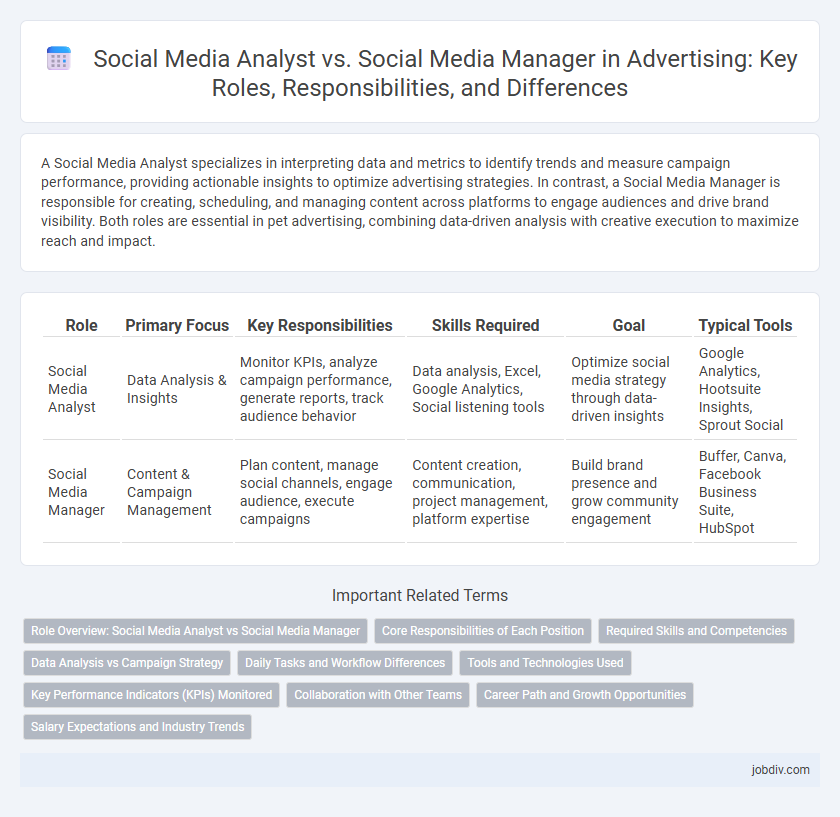A Social Media Analyst specializes in interpreting data and metrics to identify trends and measure campaign performance, providing actionable insights to optimize advertising strategies. In contrast, a Social Media Manager is responsible for creating, scheduling, and managing content across platforms to engage audiences and drive brand visibility. Both roles are essential in pet advertising, combining data-driven analysis with creative execution to maximize reach and impact.
Table of Comparison
| Role | Primary Focus | Key Responsibilities | Skills Required | Goal | Typical Tools |
|---|---|---|---|---|---|
| Social Media Analyst | Data Analysis & Insights | Monitor KPIs, analyze campaign performance, generate reports, track audience behavior | Data analysis, Excel, Google Analytics, Social listening tools | Optimize social media strategy through data-driven insights | Google Analytics, Hootsuite Insights, Sprout Social |
| Social Media Manager | Content & Campaign Management | Plan content, manage social channels, engage audience, execute campaigns | Content creation, communication, project management, platform expertise | Build brand presence and grow community engagement | Buffer, Canva, Facebook Business Suite, HubSpot |
Role Overview: Social Media Analyst vs Social Media Manager
A Social Media Analyst specializes in data-driven insights, monitoring engagement metrics, audience behavior, and campaign performance to optimize social strategies based on analytics. In contrast, a Social Media Manager focuses on creating and executing content plans, managing community interactions, and driving brand presence across platforms. Both roles collaborate closely to enhance digital marketing effectiveness but differ in emphasis on analysis versus content management.
Core Responsibilities of Each Position
Social Media Analysts focus on tracking, measuring, and interpreting social media performance metrics to optimize campaign strategies and report trends to stakeholders. Social Media Managers oversee content creation, scheduling, and audience engagement to build brand presence and manage community relationships across platforms. Both roles collaborate to enhance social media effectiveness, with Analysts providing data-driven insights and Managers executing tactical communication plans.
Required Skills and Competencies
Social Media Analysts require strong data analysis skills, proficiency in tools like Google Analytics and Excel, and the ability to interpret social metrics to optimize campaigns. Social Media Managers need expertise in content creation, strategic planning, brand management, and community engagement to drive audience growth. Both roles demand excellent communication skills and a thorough understanding of social media platforms and trends.
Data Analysis vs Campaign Strategy
Social Media Analysts specialize in data analysis by evaluating engagement metrics, audience demographics, and content performance to inform decision-making and optimize social media strategies. Social Media Managers focus on campaign strategy development, content creation, and community management to drive brand awareness and customer engagement. The Analyst's role is data-driven insight generation, while the Manager implements strategic actions based on those insights for effective social media marketing.
Daily Tasks and Workflow Differences
A Social Media Analyst focuses on data collection, performance tracking, and generating insights from engagement metrics to optimize content strategies, while a Social Media Manager handles content creation, scheduling, community management, and campaign execution. Analysts use tools like Google Analytics, Sprout Social, or Hootsuite Analytics to measure key performance indicators (KPIs) and report ROI, whereas Managers coordinate teams, develop social calendars, and interact directly with followers and influencers. The Analyst's workflow is more data-driven and research-oriented, emphasizing trends and audience behavior, whereas the Manager's daily tasks are operational and creative, centered on brand messaging and customer engagement.
Tools and Technologies Used
Social Media Analysts primarily utilize data analytics tools such as Google Analytics, Sprout Social, and Hootsuite Insights to track campaign performance, audience engagement, and sentiment analysis. Social Media Managers rely on scheduling and content creation platforms like Buffer, Canva, and HubSpot to execute strategies, manage posting calendars, and drive brand presence. Both roles integrate AI-powered tools and CRM software to enhance targeting, optimize outreach, and analyze consumer behavior.
Key Performance Indicators (KPIs) Monitored
Social Media Analysts primarily focus on monitoring KPIs such as engagement rates, click-through rates (CTR), conversion rates, and audience demographics to evaluate campaign performance and user behavior. Social Media Managers track broader KPIs including brand awareness metrics, follower growth, content reach, and overall ROI to guide content strategy and community management. Both roles use analytics tools like Google Analytics, Facebook Insights, and Hootsuite Analytics to gather data that informs strategic decisions and optimizes social media campaigns.
Collaboration with Other Teams
Social Media Analysts work closely with marketing, sales, and customer service teams to provide data-driven insights that shape campaign strategies. Social Media Managers collaborate with creative and content teams to ensure messaging aligns with brand goals and audience engagement objectives. Effective collaboration between analysts and managers enhances decision-making and optimizes advertising performance across platforms.
Career Path and Growth Opportunities
A Social Media Analyst specializes in data interpretation, tracking engagement metrics, and optimizing campaign performance, positioning themselves for roles in digital strategy or market research. Social Media Managers oversee content creation and audience engagement, cultivating leadership skills and expanding into broader marketing management or brand strategy roles. Career growth for analysts leans toward data-driven decision making, while managers advance through strategic brand development and team leadership.
Salary Expectations and Industry Trends
Social Media Analysts typically earn between $55,000 and $75,000 annually, with a focus on data-driven insights and performance metrics, while Social Media Managers command higher salaries ranging from $65,000 to $90,000 due to their strategic role in campaign development and brand communication. Industry trends indicate growing demand for Social Media Analysts skilled in advanced analytics platforms like Google Analytics and Tableau, whereas Social Media Managers benefit from expertise in content creation, audience engagement, and cross-channel campaign management. The evolving landscape shows a convergence of analytics and creative skills, pushing salary expectations upward as companies invest in integrated social media strategies.
Social Media Analyst vs Social Media Manager Infographic

 jobdiv.com
jobdiv.com